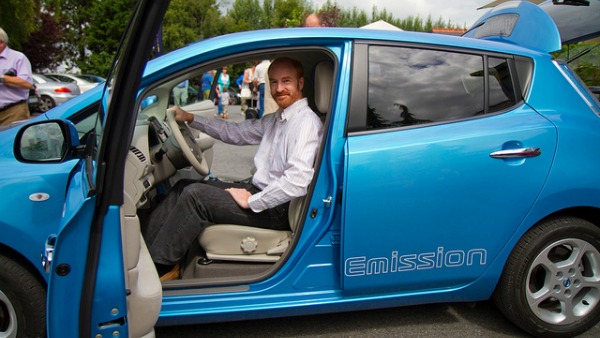
Tom RafteryYou could be as happy as this guy.
It’s easy to see the electric car as a symbol of the kind of offbeat elitism often associated with eco-conscious living — the rich man’s veggie oil-powered VW bus, if you will. But that could change as the industry starts going Model T on EVs, making them more affordable for the masses. Automakers are now offering an array of discount leases and perks that, when combined with government tax incentives, make EV ownership accessible for a much broader segment of the population.
Owning an electric vehicle automatically slashes drivers’ fuel costs by as much as 80 percent. But it’s the up-front cash that presents a barrier to most prospective buyers, not to mention the lack of widespread charging infrastructure. Of course, growing ranks of EV drivers would spur the construction of more charging stations and attract still more electric converts. But with so few choices on the market, none of them wildly affordable, it’s hard to get that cycle started.
Until now. The Wall Street Journal reports:
Bronson Beisel, 46, says he was looking last fall for an alternative to driving his gas-guzzling Ford Expedition sport utility around suburban Atlanta, when he saw a discounted lease offer for an all-electric Nissan Leaf. With $1,000 down, Mr. Beisel says he got a two-year lease for total out-of-pocket payments of $7,009, a deal that reflects a $7,500 federal tax credit.
As a resident of Georgia, Mr. Beisel is also eligible for a $5,000 subsidy from the state government. Now, he says, his out-of-pocket costs for 24 months in the Leaf are just over $2,000. Factor in the $200 a month he reckons he isn’t paying for gasoline to fill up his hulking SUV, and Mr. Beisel says “suddenly the car puts $2,000 in my pocket.”
Beisel also got a charging station installed at his house for no up-front cost. He’s spending less than $15 a month so far for the electricity needed to power the Leaf. That means that, including charging costs, he’s paying no more than $1,180 a year to drive his EV around town. Compare that to the $9,000 per year it costs to own and operate a typical gas-powered car.
Beisel compared the deal to “a two-year test drive, free.” Another Leaf driver is taking that approach literally:
Matt Brooks, a software engineer in Rochester, N.Y., says he decided to replace a hybrid Prius with a Leaf because the lease was so cheap. He’s paying $239 a month for 24 months with no money down. Mr. Brooks says he likes the car, but doesn’t expect to buy it when the lease is done. Used Leafs are selling below the purchase price written into his lease, he says.
Manufacturers are under pressure to comply with state regulations like California’s, which requires that by 2018, 4.5 percent of cars sold in the state be zero-emission vehicles; by 2025, 15 percent. Only the Nissan Leaf and the Tesla Model S sold more than 1,000 cars during the first quarter this year. But discount leases like the ones Brooks and Beisel have could help those numbers rapidly accelerate.
In an effort to ramp up production and lower costs, Nissan is increasingly manufacturing the Leaf and its pricey battery packs at factories in Tennessee instead of in Japan (creating American jobs in the process). This helped drop the 2013 Leaf’s starting price ($28,800) by $6,400 compared to last year’s model.
Of course, the one major drawback of EVs is that they’re primarily city cars because most roads still lack charging stations. That’s why many EV owners still keep a gas guzzler around for out-of-town trips. But one automaker has a solution to that problem: As part of the $32,500-plus cost of its new 500e electric, Fiat USA offers 12 days a year of free access to a gas-powered rental car. So unless you’re planning a truly epic road trip, you don’t need to own a second car in order to hit the highway.
And hey, if a guy with a name as bro-y as Bronson Beisel, not to mention a veteran New York cabbie, can proudly pilot an electric car, they’re clearly not just for highfalutin hippies anymore.




